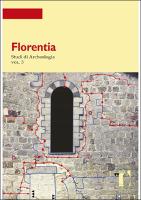Florentia
Studi di archeologia: vol. 3
| dc.contributor.editor | Vannini, Guido | |
| dc.date.accessioned | 2022-05-31T10:28:54Z | |
| dc.date.available | 2022-05-31T10:28:54Z | |
| dc.date.issued | 2017 | |
| dc.identifier | ONIX_20220531_9788864535098_695 | |
| dc.identifier | OCN: 1009110935 | |
| dc.identifier.issn | 2704-5870 | |
| dc.identifier.uri | https://library.oapen.org/handle/20.500.12657/55411 | |
| dc.language | Italian | |
| dc.relation.ispartofseries | Strumenti per la didattica e la ricerca | |
| dc.title | Florentia | |
| dc.title.alternative | Studi di archeologia: vol. 3 | |
| dc.type | book | |
| oapen.abstract.otherlanguage | The third volume of Florentia continues the periodic series of studies related to the education activities of the School of Specialization in Archaeology of the University of Florence. The selected studies are elaborations drawn from the best graduation dissertations written by students in recent years, according to criteria that favour the elements of greater thematic innovation and methodological solidity. The essays represent the fundamental specializations of the School: pre-protohistoric, orientalistic, “classical” (in its various components, Greco-Roman and Etruscan-Italic), medieval. The authors come from universities throughout the country: a variety that nevertheless reveals the cultural background characterising the Florentine Archaeological School, starting from the lesson of the renowned founders of the School, Paolo Emilio Pecorella and Luigi Beschi, to whose memory this volume is dedicated. The collaboration between professors (mostly young people) and students gives form to a community coordinated with the other Specialization Schools of the University dealing with territorial cultural heritage (Archaeology, History of Art, Architecture). The topics chosen are also projected into a public dimension, in relation to the main issues of the current civil society - from the social impact of the role of the militant archaeologist, to the contribution of the identity of a “public archaeology” in a society that rapidly changes among “new Italians” and a social use of culture, to the new role of archaeology - also in crisis contexts and not only international ones. | |
| oapen.identifier.doi | 10.36253/978-88-6453-509-8 | |
| oapen.relation.isPublishedBy | bf65d21a-78e5-4ba2-983a-dbfa90962870 | |
| oapen.relation.isbn | 9788864535098 | |
| oapen.relation.isbn | 9788864535081 | |
| oapen.relation.isbn | 9788892732346 | |
| oapen.series.number | 190 | |
| oapen.pages | 374 | |
| oapen.place.publication | Florence |

